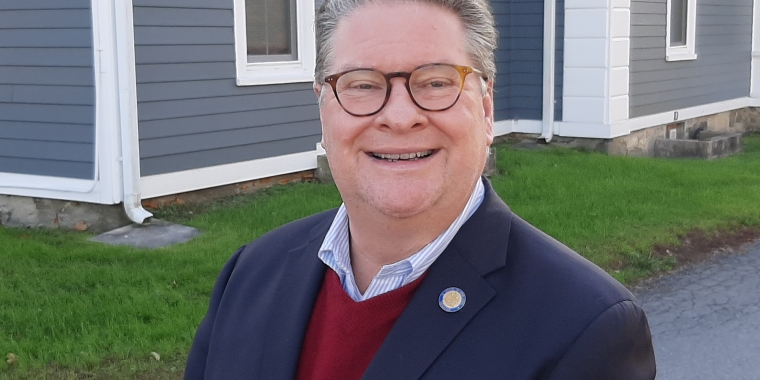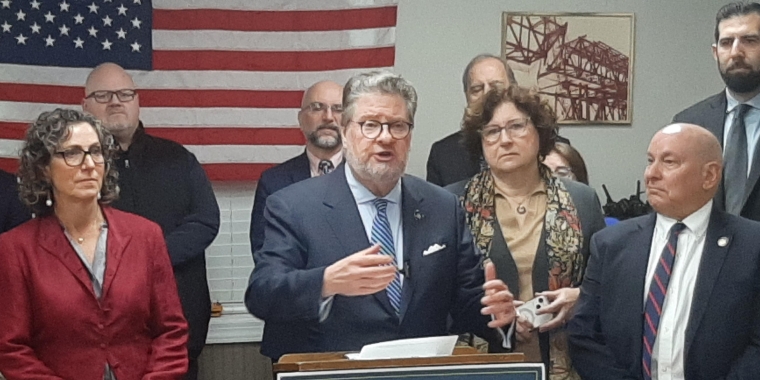
Harckham Bill Prohibiting Grade 4 Fuel Oil in NY Buildings After July 2026 Passes in Senate
March 31, 2023

Albany, NY – New York State Senator Pete Harckham and colleagues in the State Senate passed his bill today prohibiting grade 4 fuel oil from being used in buildings and facilities statewide after July 1, 2026. The bill (S.2994A), which received bipartisan support, allows municipalities in New York to enact even more stringent laws banning use of the oil.
“We need to stop burning heavy fuel oils that cause air pollution and add carcinogenic chemicals and greenhouse gases to the atmosphere if we want to seriously safeguard our residents and fight climate change,” said Harckham. “This legislation prohibiting the use of grade 4 fuel in New York will result in much cleaner air and health benefits, especially in our cities and communities requiring environmental justice.”
Trevor Summerfield, Director of Advocacy for the American Lung Association in New York said, “We know that burning fossil fuels causes air pollution that is harmful to the health of New Yorkers. We are thrilled to see the New York State Senate take steps to end the use of grade 4 fuel in buildings, clearing the way for New Yorkers to breathe healthier, cleaner air. The Lung Association now calls on the Assembly to do the same.”
New York’s landmark Climate Leadership and Community Protection Act (CLCPA), enacted in 2019, sets a clear mandate to phase-out the use of fossil fuels, and as state officials finalize the scoping plan for the law, it is incumbent to take steps to phase out harmful fuels. (In 2021, New York State passed legislation to phase out fuel grade oil 6, taking effect this year on July 1, 2023.)
Grade 4 fuel oil is one of the most harmful and polluting types of heating oil that can be used in buildings. This fuel grade contains high concentrations of contaminants, such as polycyclic aromatic hydrocarbons (PAHs), heavy metals, nitric oxide, sulfur dioxide, nickel, and black carbon. PAHs are proven human carcinogens and sulfur dioxide and nitric oxide are known respiratory irritants.
Studies show combustion of fuel oil grade 4 forms soot that is composed of a complex mix of toxic pollutants. Produced during incomplete combustion of heavy heating oils, soot is conveyed into the atmosphere creating a source of air pollution and contributing to respiratory illness. And because soot is made of fine airborne particles less than 2.5 microns in diameter, it is easily inhaled.
Toxic soot can penetrate deep into the lungs, cross the bloodstream, and get into organs, causing a multitude of health problems for people of all ages; infants, children, and the elderly are particularly vulnerable to diseases caused by air pollution, including but not limited to asthma, bronchitis, cancer, heart disease and pneumonia.
New York City has required their buildings to change over to a cleaner fuel oil than grade 4 in all buildings by 2027, while Westchester County passed a local law phasing out all use of both grade 2 and 4 fuel oils by this year.
Harckham’s bill will require that use of fuel oil grade number 4 be phased out by July 2026, which is enough time to accomplish this important environmental change especially in light of the fact that many municipalities are taking it upon themselves to enact this change in an even more expedited manner.
Roger Downs, Conservation Director of the Sierra Club Atlantic Chapter, Said, “New York is rapidly transitioning to healthier, renewable energy powered, all-electric homes and businesses. But this plan for improved air quality and climate justice isn’t going to happen overnight. While we wait for this future of geothermal heat pumps and super-efficient homes, New York must stop burning the dirtiest fuels in our most pollution-burdened neighborhoods. The Sierra Club applauds the leadership of Senator Harckham and his Senate colleagues for passing legislation that phases out the use of No.4 home heating fuel oil statewide, ending a long legacy of neighborhood air pollution and serious pulmonary diseases. We call on the Assembly and Governor to make this ban law.”
related legislation
Share this Article or Press Release
Newsroom
Go to NewsroomHarckham Finishes 2024 with 22 of His Bills Signed into Law
January 9, 2025

Seven Harckham Bills Protecting the Environment Signed into Law
October 21, 2024


